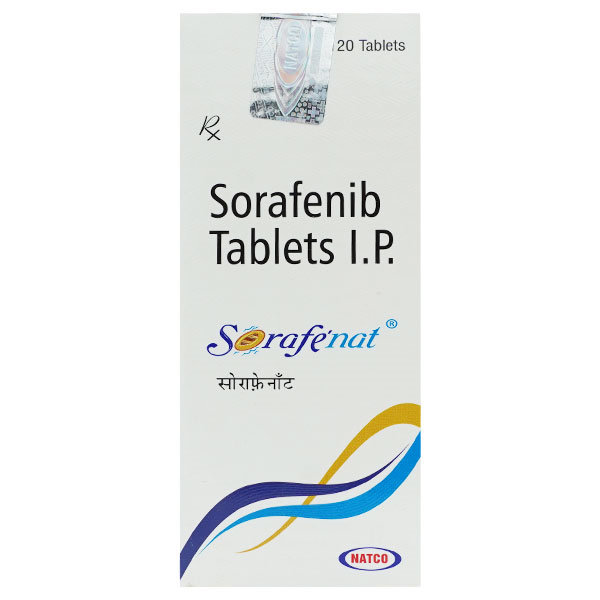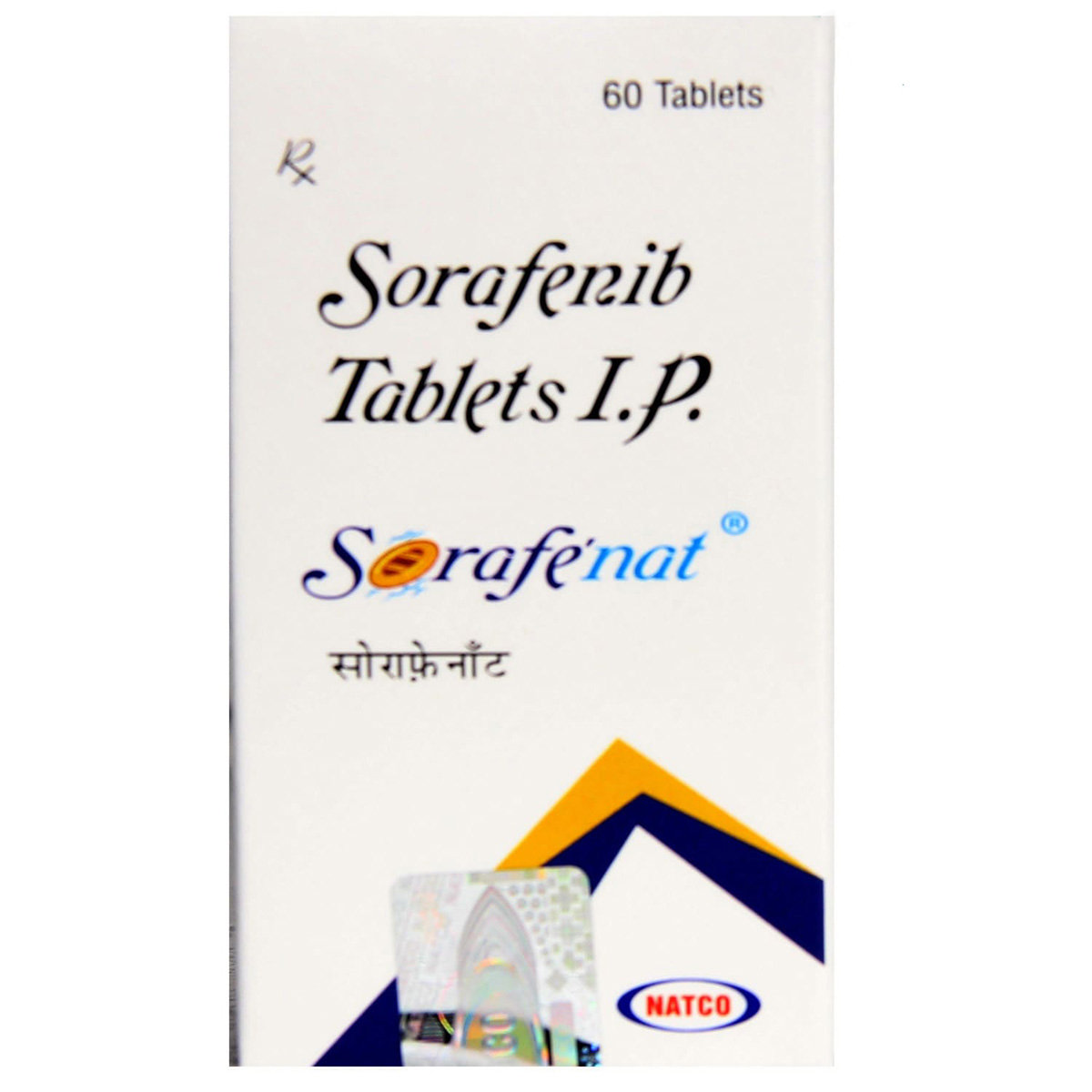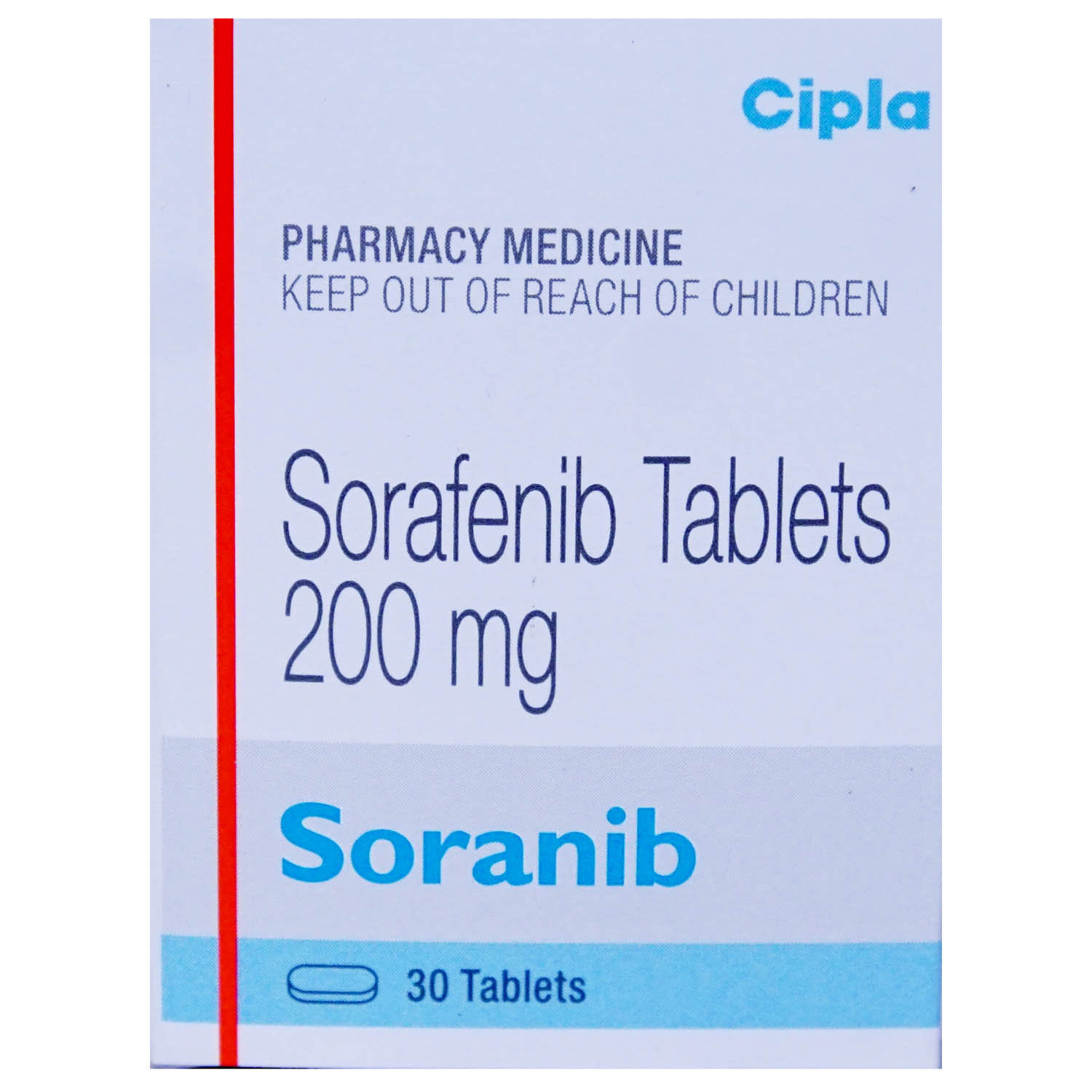Sorafenat Tablet 30's
MRP ₹2350
(Inclusive of all Taxes)
₹352.5 Cashback (15%)
Selected Pack Size:30
30 ₹2115
(₹70.5 per unit)
In Stock
120 ₹7281.6
(₹60.68 per unit)
In Stock
60 ₹3907.2
(₹65.12 per unit)
In Stock
Provide Delivery Location
Online payment accepted
 Prescription drug
Prescription drugWhats That
Composition :
Manufacturer/Marketer :
Consume Type :
Expires on or after :
Return Policy :
About Sorafenat Tablet
Sorafenat Tablet belongs to the group of medicine called ‘anti-cancer’ that is primarily indicated in the treatment of kidney, liver, and thyroid cancer. Kidney cancer is also known as renal cancer is a disease in which healthy cells of the kidney become malignant (cancerous), grow in an uncontrolled manner, and forms a tumour. Cancer of the liver is known as liver cancer. When cancer occurs in the liver, it destroys healthy cells of the liver and affects the ability of the liver to function normally. Thyroid cancer occurs when cells start multiplying in the thyroid gland and form a tumour. The tumour is a collection of abnormal cells.
Sorafenat Tablet contains 'Sorafenib' that falls in the category of medicines known as 'kinase inhibitors'. It works by stopping the action of an abnormal protein that causes the multiplication of cancerous cells. In this way, it stops the spread of cancerous cells.
Take Sorafenat Tablet as prescribed by your doctor. You are suggested to take Sorafenat Tablet as long as your doctor has prescribed it after checking your medical condition. In some cases, you may experience certain common side-effects such as itching or skin rash, acne, dry skin, vomiting, diarrhoea, and loss of appetite. Most of these side-effects do not require medical attention and will resolve gradually over time. However, you are advised to talk to your doctor if you experience these side-effects persistently.
To treat your condition effectually, continue taking Sorafenat Tablet for as long as your doctor has prescribed. Do not take Sorafenat Tablet if you are pregnant or planning for pregnancy as Sorafenat Tablet causes serious birth defects. Sorafenat Tablet should not be taken by breastfeeding mothers as it passes into breast milk and may cause a possible risk to the infant. Elderly people are more sensitive to the medicine so the doctor may adjust the dosage according to the condition. Avoid consuming alcohol along with Sorafenat Tablet as it could lead to increased dizziness.
Uses of Sorafenat Tablet
Directions for Use
Key Benefits
Sorafenat Tablet is a ' tyrosine kinase inhibitor (TKI)', that stops the uncontrolled growth and spread of cancerous cells. Sorafenat Tablet is effective in treating thyroid, liver and kidney cancer. It acts by stopping the action of the abnormal protein that is responsible for the multiplication of cancerous cells. Whenever a new healthy cell is formed it undergoes a usual process of maturity. Cancerous cells form new cells more quickly so Sorafenat Tablet targets cancerous cells and block the action of Tyrosine kinases enzymes (responsible for causing cancer). In this way, Sorafenat Tablet stops the production, spread and growth of cancerous cells in the body.
Storage
- Inform Your Doctor: Notify your doctor immediately about your diarrhoea symptoms. This allows them to adjust your medication or provide guidance on managing side effects.
- Stay Hydrated: Drink plenty of fluids to replace lost water and electrolytes. Choose water, clear broth, and electrolyte-rich drinks. Avoid carbonated or caffeinated beverages to effectively rehydrate your body.
- Follow a Bland Diet: Eat easy-to-digest foods to help firm up your stool and settle your stomach. Try incorporating bananas, rice, applesauce, toast, plain crackers, and boiled vegetables into your diet.
- Avoid Trigger Foods: Steer clear of foods that can worsen diarrhoea, such as spicy, fatty, or greasy foods, high-fibre foods, and dairy products (especially if you're lactose intolerant).
- Practice Good Hygiene: Maintain good hygiene to prevent the spread of infection. To stay healthy, wash your hands frequently, clean and disinfect surfaces regularly, and avoid exchanging personal belongings with others.
- Take Anti-Diarrheal Medications: If your doctor advises, anti-diarrheal medications such as loperamide might help manage diarrhoea symptoms. Always follow your doctor's directions.
- Keep track of your diarrhoea symptoms. If they don't get better or worse or are accompanied by severe stomach pain, blood, or dehydration signs (like extreme thirst or dark urine), seek medical help.
- Inform your doctor about the nausea and discuss possible alternatives to the medication or adjustments to the dosage.
- Divide your daily food intake into smaller, more frequent meals to reduce nausea.
- Opt for bland, easily digestible foods like crackers, toast, plain rice, bananas, and applesauce.
- Avoid certain foods that can trigger nausea, such as fatty, greasy, spicy, and smelly foods.
- Drink plenty of fluids, such as water, clear broth, or electrolyte-rich beverages like coconut water or sports drinks.
- Use ginger (tea, ale, or candies) to help relieve nausea.
- Get adequate rest and also avoid strenuous activities that can worsen nausea.
- Talk to your doctor about taking anti-nausea medication if your nausea is severe.
- Record when your nausea occurs, what triggers it, and what provides relief to help you identify patterns and manage your symptoms more effectively.
- Preventing Vomiting (Before it Happens)
- Take medication exactly as prescribed by your doctor. This can help minimize side effects, including vomiting.
- Having a small meal before taking your medication can help reduce nausea and vomiting.
- Talk to your doctor about taking anti-nausea medication along with your prescribed medication.
- Managing Vomiting (If it Happens)
- Try taking ginger in the form of tea, ale, or candy to help alleviate nausea and vomiting.
- What to Do if Vomiting Persists
- Consult your doctor if vomiting continues or worsens, consult the doctor for guidance on adjusting your medication or additional treatment.
- Inform your doctor about your constipation symptoms. They may adjust your medication or advise alternative treatments.
- Stay hydrated by drinking sufficient of water (at least 8-10 glasses a day) to help soften stool and promote bowel movements.
- Increase fibre intake by eating foods high in fibre, such as fruits, whole grains, vegetables and legumes, to help bulk up the stool.
- Establish a bowel routine by trying to go to the bathroom at the same time each day to train your bowels.
- Engaging in regular exercise, like walking or yoga, can support in bowel movement stimulation.
- Consult your doctor if constipation persists, and discuss alternative treatments or adjustments to your medication.
- Drink water or other clear fluids.
- To prevent worsening of pain, limit intake of tea, coffee, or alcohol.
- Include bland foods like rice, toast, crackers, and rice in your diet.
- Avoid lying down immediately after eating as it may cause indigestion or heartburn.
- Avoid acidic and spicy food as it may cause indigestion.
- Report the itching to your doctor immediately; they may need to change your medication or dosage.
- Use a cool, damp cloth on the itchy area to help soothe and calm the skin, reducing itching and inflammation.
- Keep your skin hydrated and healthy with gentle, fragrance-free moisturizers.
- Try not to scratch, as this can worsen the itching and irritate your skin.
- If your doctor prescribes, you can take oral medications or apply topical creams or ointments to help relieve itching.
- Track your itching symptoms and follow your doctor's guidance to adjust your treatment plan if needed. If the itching persists, consult your doctor for further advice.
- Apply moisturizer immediately after showering or bathing.
- Use a moisturizer containing lanolin, petroleum jelly, glycerine, hyaluronic acid or jojoba oil.
- Do not use hot water for bathing. Instead use warm water and limit showers and bath to 5 to 10 minutes.
- Apply a sunscreen with SPF-30 or higher.
- Avoid harsh soaps, detergents and perfumes.
- Do not scratch or rub the skin.
- Drink adequate water to prevent dehydration.
- Wear pants, full sleeves and a wide-brimmed hat while going out in the sun.
Drug Warnings
Sorafenat Tablet may make you more susceptible to infections; consult your doctor if you develop any signs of infections such as fever, sore throat, breathlessness, jaundice, unexplained bleeding, or bruising. Your doctor may advise you to undergo regular blood tests, kidney and liver tests to monitor your condition. Inform your doctor about your health condition and medicines to rule out any unpleasant side-effects. Before your doctor prescribes you Sorafenat Tablet , tell them if you have heart problems, high blood pressure, bleeding issues, surgery, or an electrolyte imbalance (like abnormal levels of magnesium, calcium, or potassium in the blood). Sorafenat Tablet is restricted to use in persons who are sensitive to any of its constituent or have squamous cell lung cancer or already taking carboplatin and paclitaxel.
Drug-Drug Interactions
Drug-Drug Interactions
Login/Sign Up
Using Pimozide together with Sorafenat Tablet can increase the risk of an irregular heart rhythm.
How to manage the interaction:
Taking Sorafenat Tablet with Pimozide can cause an interaction, consult a doctor before taking it. You should seek immediate medical attention if you develop sudden dizziness, lightheadedness, fainting, shortness of breath, or heart palpitations. Do not stop using any medications without talking to a doctor.
Using mesoridazine together with Sorafenat Tablet can increase the risk of an irregular heart rhythm.
How to manage the interaction:
Taking Mesoridazine with Sorafenat Tablet can cause an interaction, please consult a doctor before taking it. However, if you experience dizziness, lightheadedness, fainting, shortness of breath, or heart palpitations call a doctor. Do not stop using any medications without consulting a doctor.
Coadministration of Sorafenat Tablet with Sparfloxacin can prolong the QT interval (QT interval is a measurement made on an electrocardiogram used to assess some of the electrical properties of the heart) may result in additive effects and increased risk of ventricular arrhythmias (abnormal heart rhythm).
How to manage the interaction:
Co-administration of Sumatriptan with Sparfloxacin can result in an interaction, but it can be taken if a doctor has advised it. Do not stop using any medications without talking to a doctor.
Using thioridazine together with Sorafenat Tablet can increase the risk of an irregular heart rhythm.
How to manage the interaction:
Taking Sorafenat Tablet with Thioridazine together is not recommended as it can cause an interaction, consult a doctor before taking it. You should seek immediate medical attention if you develop sudden dizziness, lightheadedness, fainting, shortness of breath, or heart palpitations. Do not stop using any medications without talking to a doctor.
Co-administration of Sorafenat Tablet with Ziprasidone can increase the risk of irregular heart rhythm.
How to manage the interaction:
Taking Sorafenat Tablet with Ziprasidone together can result in an interaction, but it can be taken if a doctor has advised it. However, consult a doctor immediately if you experience any symptoms such as sudden dizziness, lightheadedness, fainting, shortness of breath, or heart palpitations. Do not discontinue any medications without consulting a doctor.
Using saquinavir together with Sorafenat Tablet can increase the risk of an irregular heart rhythm.
How to manage the interaction:
Although Sorafenat Tablet and Saquinavir is not recommended as it leads to an interaction, contact a doctor before you take Sorafenat Tablet. You should seek immediate medical attention if you develop sudden dizziness, lightheadedness, fainting, shortness of breath, or heart palpitations. Do not stop using any medications without talking to a doctor.
Using dronedarone together with Sorafenat Tablet can increase the risk of an irregular heart rhythm. The risk increases in patients with a history of heart illness or electrolyte imbalance.
How to manage the interaction:
Taking Sorafenat Tablet with Dronedarone is generally avoided as it can cause an interaction, consult a doctor before taking it. However, if you experience dizziness, lightheadedness, fainting, shortness of breath, or heart palpitations call a doctor. Do not stop using any medications without consulting a doctor.
Co-administration of Sorafenat Tablet with Carboplatin can increase the risk or severity of serious side effects.
How to manage the interaction:
Taking Sorafenat Tablet with Carboplatin together is not recommended as it can cause an interaction, consult a doctor before taking it. However if you experience any unusual symptoms, consult the doctor. Do not stop using any medications without consulting a doctor.
Coadministration of Anagrelide with Sorafenat Tablet can lead to an increased risk of irregular heart rhythms.
How to manage the interaction:
Taking Anagrelide with Sorafenat Tablet together can result in an interaction, it can be taken if your doctor has advised it. However, if you experience sudden dizziness, lightheadedness, fainting, shortness of breath, chest pain, or irregular heartbeat, contact a doctor immediately. Do not discontinue any medications without consulting a doctor.
Coadministration of Citalopram with Sorafenat Tablet can increase the risk of irregular heart rhythms.
How to manage the interaction:
Taking Citalopram with Sorafenat Tablet together can result in an interaction, it can be taken if your doctor has advised it. However, if you experience sudden dizziness, lightheadedness, fainting, shortness of breath, or irregular heartbeat, contact a doctor immediately. Do not discontinue any medications without consulting a doctor.
Drug-Food Interactions
Drug-Food Interactions
Login/Sign Up
Frozen Meals, Cheese, Red Meat, Potato Chips, Hamburgers, Hot Dogs, Ice Cream
How to manage the interaction:
Food may reduce the oral absorption and bioavailability of Sorafenat Tablet. Avoid taking Sorafenat Tablet with high fat foods.
Diet & Lifestyle Advise
- Physical activity helps in strengthening muscles reduce fatigue, helps in weight loss, and give strength. Gentle activities like 20-30minutes of walking or swimming would be helpful.
- Performing yoga and other relaxation techniques may also help in improving physical and mental health and may reduce your stress levels.
- Maintain a healthy weight by performing regular low-strain exercises and eating healthy food.
- Get adequate sleep as resting helps in improving your health, mental ability, and improves attention.
- De-stress yourself by meditating, reading books, taking a warm bubble bath, or listen to soothing music.
- Eat food rich in antioxidants such as berries, spinach, kidney beans, dark chocolate, etc.
- Foods containing fibre help in better digestion. These include beans, peas, lentils, whole grains, nuts, and seeds.
- Avoid smoking and alcohol consumption.
Side Effects of Sorafenat Tablet
- Acne
- Dry skin
- Nausea
- Vomiting
- Diarrhea
- Loss of appetite
- Itching or skin rash
Habit Forming
Therapeutic Class
All Substitutes & Brand Comparisons
RX
Out of StockSoralieva Tablet 30's
Allieva Pharma Pvt Ltd
₹83
(₹2.77 per unit)
96% CHEAPERRX
Out of StockNeosez Tablet
RPG Life Sciences Ltd
₹1250
(₹9.38 per unit)
86% CHEAPERRX
Out of StockSonora 200mg Tablet
Intas Pharmaceuticals Ltd
₹5995
(₹40.97 per unit)
41% CHEAPER
Drug-Diseases Interactions
Drug-Diseases Interactions
Login/Sign Up
FAQs
Drug-Drug Interactions Checker List
- SORAFENIB
- PACLITAXEL
- NEOMYCIN
- CARBAMAZEPINE
- PHENYTOIN
- OMEPRAZOLE
Special Advise
- Seek medical attention immediately if you have swelling in your lower legs, fast heartbeats, or trouble breathing. It may be a sign of a heart problem.
- Sorafenat Tablet may cause bleeding so tell your doctor if you see blood in urine or stools.
Disease/Condition Glossary
Cancer: It is a genetic change in which our cells divide uncontrollably and spread into surrounding tissues. There are two types of cancer, namely benign (localized) and metastatic (spread to the whole body). There are more than 100 types of cancer, including blood cancer, lung cancer, breast cancer, etc. Cancer growth can be prevented by chemotherapy (by strong antibiotics), radiation and stem cell therapy. To date, there is no cure for cancer.
Renal cancer: Kidneys help to get rid of waste by filtering blood, regulate fluid balance, and helps in making urine. Kidney cancer occurs when cancerous cells start growing uncontrollably in the kidneys.
Liver cancer: The liver is responsible for making bile that is a substance that helps in digesting fats, nutrients, and other vitamins. When the liver gets infected with cancerous cells, it destroys the liver cells and affects the ability of the liver to work properly.
Thyroid cancer: The thyroid is the gland of the body that produces hormones responsible for the functioning of the body. When thyroid cancer occurs when a person does not remain able to feel the thyroid gland.

Have a query?
Alcohol
Safe if prescribed
You are recommended to avoid alcohol consumption with Sorafenat Tablet as it may increase the risk of side effects such as dizziness, drowsiness, or difficulty in concentrating.
Pregnancy
Consult your doctor
Sorafenat Tablet is restricted to use in pregnancy. A woman needs to have a negative pregnancy test before starting treatment with this medicine. It is better to use effective birth control methods to prevent pregnancy while taking this medicine or for at least 6 months after taking the last dose of Sorafenat Tablet .
Breast Feeding
Consult your doctor
Sorafenat Tablet should not be taken by breastfeeding mothers as it passes into breast milk and may cause a possible risk to the infant.
Driving
Safe if prescribed
It is not known if Sorafenat Tablet may affect your driving ability or not.
Liver
Consult your doctor
Sorafenat Tablet is safe to take by patients dealing with liver cancer as prescribed by their doctor. The dose may be adjusted by the doctor according to the medical condition of the patient.
Kidney
Consult your doctor
Sorafenat Tablet is safe to take by patients dealing with kidney cancer as prescribed by their doctor. The dose may be adjusted by the doctor according to the medical condition of the patient.
Children
Safe if prescribed
Sorafenat Tablet is not recommended for children below 18 years as the safety and effectiveness were not established.










